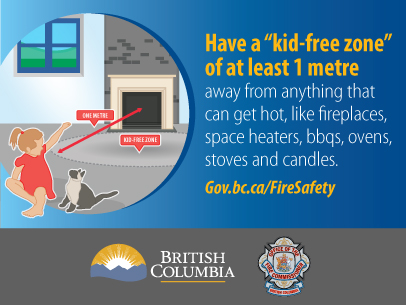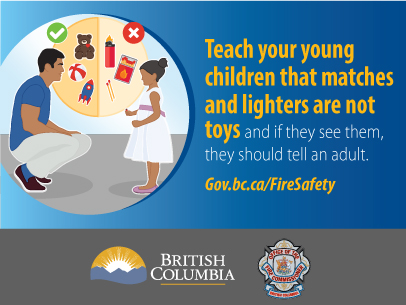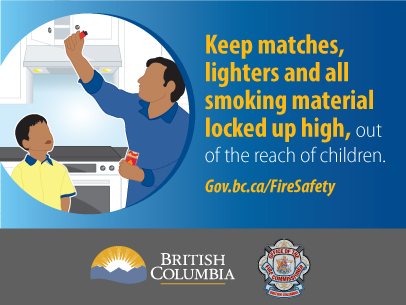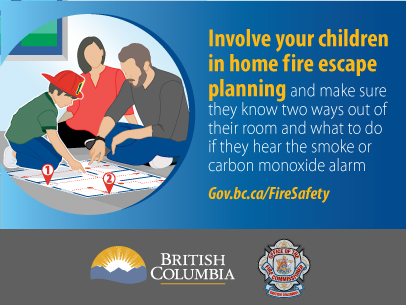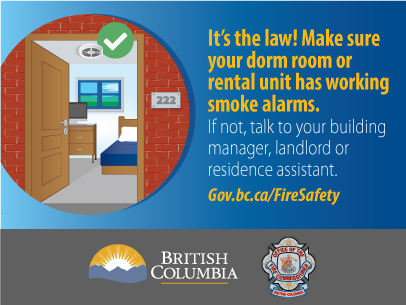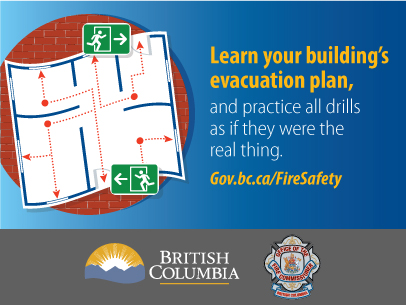Child and youth fire safety social media toolkit
The following information was created specifically for children and youth, including post-secondary students who may be away from home for the first time.
Messaging for school-aged children
Social Media
Share this content on social media channels to help the children and youth in your community stay safe from fire and other hazards.
Social media toolkit
You can copy this content or customize it to reach the people in your community.
- If there is a fire in your home, you could have less than 2 minutes to get out safely once the smoke alarm sounds.
- Make a fire escape plan. Draw a map of each level of your home showing all doors and windows. Discuss the map with everyone who lives with you.
- Plan two ways out of every room. Choose an outside meeting place in front of your home.
- Make a fire escape plan around your abilities. If you need to use a wheelchair or a cane, make sure you can get to it easily and get out quickly. If you wear hearing aids or eyeglasses, put them next to your bed while you are sleeping.
- Make sure all doors and windows open easily.
- Practise your fire escape plan by having a home fire drill at least twice a year with everyone in the home.
- If there is a fire in your home, get out and stay out. Never go back inside for people, pets or things.
Hashtags
#FireSafety #FirePrevention #PracticeYourPLan #GetLowAndGo #GetOutStayOut
Graphics
Download and use the graphics below, either by themselves or add additional information in your post to reinforce the message.
Fire prevention and safety messaging
The information below is designed to teach young and school-aged children about the importance of being safe around matches, lighters, smoking materials, fire and hot objects.
Preschool
Firefighters are community helpers
- Firefighters help the community stay safe from fire.
- Firefighters wear special clothes and equipment to help them stay safe from fire and smoke.
- The equipment can look and sound scary, but it keeps the firefighter safe.
- We do not need to be afraid of firefighters even though their equipment can look and sound scary.
When you hear a smoke alarm, get outside and stay outside
- Smoke alarms are very important.
- A smoke alarm will let you know if there is a fire in your home.
- Most smoke alarms make a loud “beep, beep, beep” sound if there is smoke.
- When you hear the smoke alarm, get outside and stay outside until a grown-up says it’s safe to go back inside.
Practice a fire drill with your family
- The smoke alarm makes a “beep, beep, beep” sound.
- If you hear “beep, beep, beep,” get up and walk. Do not run, but walk quickly.
- Know two ways out of every room.
- Get yourself outside quickly.
- Go to your outside meeting place with your family.
Stay away from hot things
- Stay away from hot things. Do not touch them.
- Do not touch things that are sometimes hot.
- Do not touch matches or lighters. Matches and lighters are dangerous and can be hot.
- Walk away and tell a grown-up if you see matches and lighters.
- Only grown-ups should use matches and lighters.
Tell a grown-up if you see matches and lighters
- Stay away from hot things. Do not touch them.
- Do not touch matches or lighters. Matches and lighters are dangerous and can be hot.
- Walk away and tell a grown-up if you find matches or lighters.
- Only grown-ups should use matches and lighters.
Kindergarten
Smoke alarms are important
- You need smoke alarms in your home.
- Having a smoke alarm in your bedroom is important so the alarm will beep where you sleep.
- A smoke alarm will let you know if there is a fire in your home.
- A smoke alarm will make a loud “beep, beep, beep (pause), beep, beep, beep (pause)” sound if there is smoke.
- If the smoke alarm sounds, everyone should get outside. Stay outside until a grown-up says it is safe to go back inside.
Get outside, stay outside
Here are five important things to do if the smoke alarm sounds:
- Get up and walk. Do not run, but walk as fast as you can.
- Learn two ways out of every room. It may be two doors or a door and a window.
- Get yourself outside quickly. Do not stop to pick up toys or pets.
- Wait at your outside meeting place with your family.
- Stay at the outside meeting place until help arrives or a grown-up says it is safe to go inside.
Fire drills at school
- When the alarm sounds, stop what you are doing and listen for instruction from your teacher or principal.
- Go quickly and quietly to your meeting place outside the school. Stay outside.
- Be sure to stay with your classmates. Your teacher will take attendance to make sure all students are safe.
Stay away from hot things
- There are things inside and outside the home that are hot or can get hot.
- Things that are hot can burn and hurt you.
- Stay away from hot things. Do not touch them.
- If an item might be hot, stay away and ask a grown-up for help.
- Things that are hot or could be hot include bath water, soup, stoves, radiators, flat irons, curling irons, fireplace irons, coffee, matches, lighters, and many other items.
- Do not touch matches or lighters. Tell a grown-up if you find matches or lighters.
Matches and lighters are for grown-ups
- Stay away from hot things. Do not touch them.
- Do not touch matches or lighters. Matches and lighters are dangerous and can be hot.
- Walk away and tell a grown-up if you find matches or lighters.
- Only grown-ups should use matches and lighters.
Firefighters are community helpers
- Firefighters help the community stay safe from fire.
- Firefighters wear special gear (clothes and equipment) to help them stay safe from fire.
- The equipment can look and sound scary, but it keeps the firefighter safe.
- We do not need to be afraid of firefighters even though their equipment can look and sound scary.
Grade 1
Smoke alarms are important
- A smoke alarm will let you know if there is a fire in your home.
- It will make a loud “beep, beep, beep (pause), beep, beep, beep (pause)” sound if there is smoke.
- If the smoke alarm sounds, everyone should leave the home right away.
- You need smoke alarms in your home.
Get outside, stay outside
- Every room needs two ways out.
- One way out would be the door and the second way out might be a window.
- Make sure your bedroom or where you sleep has a smoke alarm so you will wake up quickly and be able to use the door to get outside. You must be able to hear the “beep, beep, beep” of the smoke alarm wherever you sleep.
- It is important to have a meeting place outside the home. A good meeting place might be a neighbor’s home, a special tree, a neighborhood store next door, a mailbox, or a street light.
- If the smoke alarm sounds, get outside and go to your meeting place. Wait for your family to meet you. Grown-ups will know that everyone is safe.
- It is important that after hearing the smoke alarm you get outside and stay outside.
Report an emergency
- The fire department is a community helper.
- The fire department will help if there is an emergency. An emergency could be a fire or it could be someone in your home who is sick or hurt.
- Remember, you call the fire department only in an emergency. Calling the fire department when there is no emergency could cause others to not get the help they need.
- The number to call for our fire department is ________________.
Stay away from hot things
- There are things inside and outside the home that are hot or can get hot.
- Things that are hot or can get hot include bathtub water, soup, stoves, radiators, fireplaces, matches, lighters, flat irons, coffee, and many more things.
- Stay away from anything that is hot or could be hot. This means: Do not touch anything that could be hot.
- If you are unsure if something is hot, you should stay away from it and check with a grown-up.
- Things that are hot can burn and hurt you.
Fire drills at school
When the alarm sounds:
- Stop what you are doing.
- Listen for instructions from your teacher or principal.
- Go quickly and quietly to your meeting place outside the school.
- Be sure to stay with your classmates. Your teacher will take attendance to make sure all students are safe.
Know when to stop, drop, and roll
- Stay away from fire. Fire from a match, lighter, fireplace, or grill could catch clothes on fire.
- Clothes on fire can cause a bad burn and hurt very much.
- If your clothes catch fire or if fire gets on clothes:
- Stop where you are.
- Drop to the ground – lay flat with your legs out straight and cover your eyes and mouth with your hands.
- Roll over and over and back and forth until the flames are out.
- Get help from a grown-up who will cool the burn and get medical help.
- The most important thing to remember is to stay away from fire. It can catch your clothes on fire. Use “stop, drop, and roll” only if your clothes are on fire.
Grade 2
Smoke alarms are Important
- A smoke alarm will let people know if there is a fire in their home.
- Every home needs working smoke alarms.
- If there is smoke, the smoke alarm will make a loud “beep, beep, beep (pause), beep, beep, beep (pause)” sound.
- Make sure there is a smoke alarm where people sleep so they will wake up quickly and be able to get outside. Everyone must be able to hear the “beep, beep, beep” of the smoke alarm wherever they sleep.
- Here are four important things to do if the smoke alarm sounds:
- Stop what you are doing.
- Choose the best way out of the room.
- Get outside quickly.
- Go to your outside meeting place.
Plan and practice your home fire escape drill
- Every room needs two ways out.
- One way out would be the door and the second way out might be a window.
- It is important to have a meeting place outside the home. A good meeting place might be a neighbor’s home, a special tree, a mailbox, or a street light.
- A home fire escape plan is a plan to get out of the home quickly in case there is a fire.
- Families should practice their home fire escape drill at least twice a year.
- It is important to know the home fire escape plan in each home where you sleep. It could be the home of a family member or a friend’s house, but you should know the two ways out of each room and the outside meeting place in case there is a fire while you are visiting.
Report an emergency
- The fire department will help if there is an emergency. Examples of an emergency include fire and serious injury.
- Remember, you call the fire department only in an emergency. Calling the fire department when there is no emergency could cause others to not get the help they need. It can also put firefighters in danger needlessly.
- When the fire department answers the phone, tell them:
- The type of emergency.
- Your name.
- The location that you are calling from.
- The telephone number from where you are calling.
- Stay on the telephone until the fire department tells you to hang up.
Stay away from hot things
- There are things inside and outside that are hot or can get hot.
- Things that are hot or can get hot include bath water, a stove, a fireplace, coffee, soup, matches, lighters, and many other things.
- Stay away from hot things. Do not touch them. If you are unsure if something is hot, stay away and check with a grown-up.
- Do not touch matches or lighters. Matches and lighters are dangerous and can be hot.
- Walk away and tell a grown-up if you find matches or lighters.
- Only grown-ups should use matches and lighters.
Kid-free zones at home
- Things that get hot can cause serious burns.
- There should be a 1 metre “kid-free zone” around the stove, oven, and heating sources.
- Remind grown-ups to keep anything that can burn at least 3 feet (1 metre) away from hot things.
- Only grown-ups should be around items that are hot or could get hot.
Know when to stop, drop, and roll
- “Stop, drop, and roll” is used when clothing catches fire.
- If your clothes catch fire: (Also: When fire gets on clothes:)
- Stop where you are.
- Drop to the ground and cover your eyes and mouth with your hands.
- Roll over and over and back and forth until the flames are out.
- Get help from a grown-up who will cool the burn and get medical help.
Messaging for high school-aged children
Social Media
Share this content on social media channels to increase awareness about on- and off-campus fire safety for students in your community.
Social media toolkit
You can copy this content or customize it to reach the people in your community.
Use these key messages in the social media content that you create.
- Cook only where it is allowed. Set a timer on your phone to remind you that food is cooking
- Never leave a burning candle unattended
- Make sure cigarettes and ashes are out. Never toss hot cigarettes butts or ashes in the trash can, garden or planters
- After a party, check for cigarette butts, especially under cushions. Chairs and sofas catch on fire fast and burn quickly
- Don’t smoke when you have been drinking or are drowsy
- Never use an extension cord with large appliances, like a refrigerator
- Do not overload electrical outlets
Hashtags
#FireSafety #FirePrevention #CampusFireSafety #CollegeLife #CampusLife #StudentLife
Facebook and Twitter graphics
Download and use the graphics below, either by themselves or add additional information in your post to reinforce the message.
Fire prevention and safety messaging
Every year, too many young people experience fire emergencies in college and university residences and off-campus housing. Cooking, smoking material, social gatherings, candles and electrical short circuits are common causes of these fires.
Candles
- Burn candles only if the school permits their use. Consider using battery-operated or flameless candles.
- A candle is an open flame and should be placed away from anything that can burn.
- Never leave a candle unattended. Blow it out when you leave the room or go to sleep.
Cooking
- Reduce the risk of cooking fires by being alert. You may not be fully be alert if you are tired, drowsy or or impaired by alcohol, cannabis, other drugs or certain medications.
- Check your school’s rules before using cooking or electrical appliances in your room.
- Stay in the kitchen when you are frying, grilling, or broiling food. If you leave the kitchen for even a short period of time, turn off the stove.
- If you are simmering, baking, roasting, or boiling food, check it regularly, remain in the home while food is cooking, and use a timer to remind you that you’re cooking.
- Keep things that can catch fire — potholders, oven mitts, paper or plastic bags, curtains — away from your stove top.
- Wear short, close-fitting or tightly rolled sleeves when cooking. Loose clothing can dangle onto stove burners and can catch fire if it comes in contact with a gas flame or electric burner.
- Open microwaved food slowly, away from the face. Hot steam from a container of microwaved food or the food itself can cause burns.
- Treat a burn right away, putting it in cool water. Cool the burn for three to five minutes. Cover with a clean, dry cloth. If the burn is bigger than your fist, or if you have any questions, get medical help right away.
If you have a small grease or oven cooking fire:
- On the stove top, smother the flames by sliding a lid over the pan and turning off the burner. Leave the pan covered until it is completely cooled.
- Never pour water or use a fire extinguisher on a cooking pan grease fire!
- For an oven fire, turn off the heat and keep the door closed. After a fire, the oven should be checked and/or serviced before being used again.
If you have any doubt, get out!
- When you leave, close the door behind you to help contain the fire.
- Call 911 or your local emergency number from outside.
Electrical equipment
- Only use one heat-producing appliance (such as a coffee maker, toaster, space heater, etc.) plugged into a receptacle outlet at a time.
- Major appliances (refrigerators, dryers, washers, stoves, air conditioners, microwave ovens, etc.) should be plugged directly into a wall receptacle outlet. Extension cords and plug strips should not be used.
- Check electrical cords to make sure they are not running across doorways or under carpets. Extension cords are intended for temporary use.
- You do not need a flame to start a fire. Fires can start when heat builds up near things that burn. This can happen when a hot light bulb is near things that burn, such as cloth or paper, or a cord has been placed under a carpet.
- Use a light bulb with the right number of watts. There should be a sticker that indicates the right number of watts.
Call a qualified electrician or your landlord if you have:
- Frequent problems with blowing fuses or tripping circuit breakers
- A tingling feeling when you touch an electrical appliance
- Discolored or warm wall outlets
- A burning or rubbery smell coming from an appliance
- Flickering or dimming lights
- Sparks from an outlet
Smoke alarms and escape planning
- Make sure you can hear the building alarm system when you are in your room.
- If you live in a dormitory, make sure your sleeping room has a smoke alarm, or your dormitory suite has a smoke alarm in each living area as well as the sleeping room. For the best protection, all smoke alarms in the dormitory suite should be interconnected so that when one sounds, they all sound.
- If you live in an apartment or house, make sure smoke alarms are installed in each sleeping room, outside every sleeping area, and on each level of the apartment unit or house. For the best protection, all smoke alarms in the apartment unit or house should be interconnected so that when one sounds, they all sound.
- Be alarmed! Test all smoke and carbon monoxide alarms at least once a month.
- Never remove batteries or disable the alarm.
- Learn your building’s evacuation plan and practise all drills as if they were the real thing.
- If you live off campus, have a fire escape plan with two ways out of every room.
- When the smoke alarm or fire alarm sounds, get out of the building quickly and stay out. Call 911 or the local emergency number once you are safely outside.
Smoking and smoking materials
- Smoking materials include matches, lighters, e-cigarettes, tobacco as well as cannabis, and are one of the top causes of residential fires in B.C.
- If you smoke, consider smoking outside and only where it is permitted, and encourage friends or family who smoke to do the same.
- If you do smoke inside, use large, deep ashtrays. Be cautious when smoking on sofas and couches – a burning cigarette can smolder between the cushions of upholstered furniture and go unnoticed for hours.
- Properly extinguish and dispose of all smoking materials in large, deep ashtrays. Do not discard of any smoking materials in garbage cans or vegetation such as mulch, planter boxes, potted plants or landscaping, peat moss, dried grasses, leaves or other things that could ignite easily.
- Don’t smoke in bed, or when you are drowsy or impaired by alcohol, cannabis, other drugs or certain medications.
- Allow ashes to cool completely before disposing.
Electronic cigarettes
- Fires have occurred while e-cigarettes were being used, the battery was being charged, or the device was being transported.
- Battery failures have led to small explosions.
- Never leave charging e-cigarettes unattended.
- E-cigarettes should be used with caution
Social gatherings
- Avoid over-crowding. The more people attending the party, the easier it is to lose control of the situation.
- When you enter a building, look for all available exits. Some exits may be in front and some in back of you. Be prepared to use your closest exit as you may not be able to use the main exit.
- If you smoke – be it cannabis or tobacco – consider smoking outside and only where it is permitted, and encourage friends or family who smoke to do the same.
- If you do smoke inside, use large, deep ashtrays. Be cautious when smoking on sofas and couches – a burning cigarette can smolder between the cushions of upholstered furniture and go unnoticed for hours.
- Refrain from burning candles during parties. They can easily be knocked over or ignite nearby combustibles, unnoticed.
- If an alarm sounds, you see smoke or fire, or some other unusual disturbance immediately exit the building in an orderly fashion.
- Once you have escaped, stay out. Under no circumstances should you ever go back into a burning building. Let trained firefighters conduct rescue operations.
Contact Us
If you have questions about the resources or curriculum on these pages, please contact OFC@gov.bc.ca.
®The name and image of Sparky and the title Sparky the Fire Dog, are registered trademarks of the National Fire Protection Association, Quincy, MA 02169.

